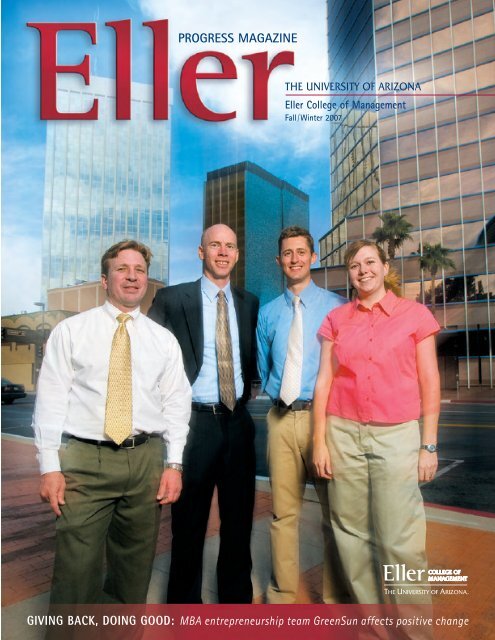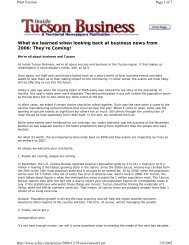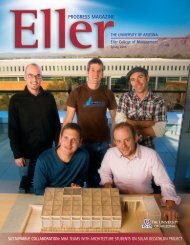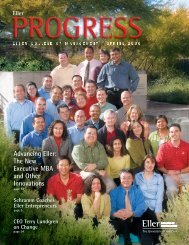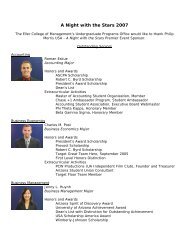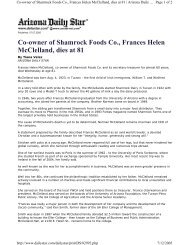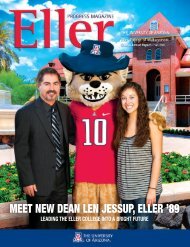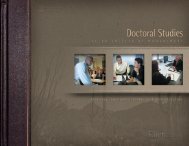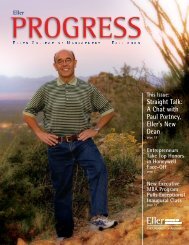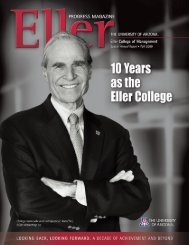PROGRESS MAGAZINE - Eller College of Management - University ...
PROGRESS MAGAZINE - Eller College of Management - University ...
PROGRESS MAGAZINE - Eller College of Management - University ...
You also want an ePaper? Increase the reach of your titles
YUMPU automatically turns print PDFs into web optimized ePapers that Google loves.
BRIEFINGSNEW FACULTYAT THE ELLER COLLEGEGAUTAM GOWRISANKARANAssociate Pr<strong>of</strong>essor <strong>of</strong> EconomicsPh.D., Yale <strong>University</strong>,1995IVALINA KALCHEVAAssistant Pr<strong>of</strong>essor <strong>of</strong> FinancePh.D., <strong>University</strong> <strong>of</strong> Utah,2007OLIVER ZHEN LIAssociate Pr<strong>of</strong>essor <strong>of</strong> AccountingPh.D., The <strong>University</strong> <strong>of</strong> Arizona,2003NATHAN PODSAKOFFAssistant Pr<strong>of</strong>essor <strong>of</strong><strong>Management</strong> and OrganizationsPh.D., <strong>University</strong> <strong>of</strong> Florida,2007PAUL W. RHODEPr<strong>of</strong>essor <strong>of</strong> EconomicsPh.D., Stanford <strong>University</strong>,1990CRAIG SMITHAssistant Pr<strong>of</strong>essor <strong>of</strong> PublicAdministration and PolicyPh.D., <strong>University</strong> <strong>of</strong> Georgia,2007Gautam Gowrisankaran joins the <strong>Eller</strong><strong>College</strong> faculty full time after servingas a visiting pr<strong>of</strong>essor in the spring.Previously, Gowrisankaran was anassistant pr<strong>of</strong>essor <strong>of</strong> economics atWashington <strong>University</strong>, and a seniorfellow at the <strong>University</strong>’s Center forHealth Policy. His research interestsinclude industrial organization, healtheconomics, and applied econometrics.Recent papers have examined thedynamics <strong>of</strong> pricing for durablegoods industries and issues relatedto competition among hospitalsand health care providers.Ivalina Kalcheva holds a Ph.D. fromthe <strong>University</strong> <strong>of</strong> Utah, an MBA fromSaginaw Valley State <strong>University</strong>, and abachelor's degree from the <strong>University</strong><strong>of</strong> Economics in her native Bulgaria.Her research interests fall into theoverlap between market microstructureand the classical fields in finance.Her co-authored paper "InternationalEvidence on Cash Holdings andExpected Managerial Agency Problems"is forthcoming in The Review <strong>of</strong>Financial Studies. Kalcheva’s teachinginterests include corporate finance,investments, institutions, andinternational finance.Oliver Zhen Li earned his Ph.D. atThe <strong>University</strong> <strong>of</strong> Arizona’s <strong>Eller</strong><strong>College</strong> <strong>of</strong> <strong>Management</strong>, and returnsto teach here from the <strong>University</strong><strong>of</strong> Notre Dame, where he served asassistant pr<strong>of</strong>essor <strong>of</strong> accountancy since2003. Li also holds an MBA from IllinoisState <strong>University</strong> and spent three yearswith HSBC Holdings as a credit analystand assistant division manager. Lihas co-authored several papers with<strong>Eller</strong> accounting department headDan Dhaliwal, including “Taxes, Leverage,and the Cost <strong>of</strong> Equity Capital,” and“Did the 2003 Tax Act Reduce the Cost<strong>of</strong> Equity Capital?”Nathan Podsak<strong>of</strong>f comes to the <strong>Eller</strong><strong>College</strong> from the <strong>University</strong> <strong>of</strong> Florida,where he earned his Ph.D. and taughtcourses in human resources andorganizational behavior. His areas <strong>of</strong>research interest include organizationalstress, leadership, and researchmethods related to the measurementand modeling <strong>of</strong> constructs. Currentpapers examine scholarly influencein the field <strong>of</strong> management and themediating effects <strong>of</strong> employee justiceperceptions. Podsak<strong>of</strong>f earned hisundergraduate degree in psychologyfrom Princeton <strong>University</strong>.Paul W. Rhode came to the <strong>Eller</strong> <strong>College</strong>in Spring <strong>of</strong> 2007 from the <strong>University</strong><strong>of</strong> North Carolina — Chapel Hill. He isa noted expert in American economichistory, and teaches courses includingmicroeconomics at <strong>Eller</strong>. Rhode iscurrently studying the role <strong>of</strong> biologicallearning in American agriculture beforethe advent <strong>of</strong> hybrid corn and syntheticfertilizers in the 1930s. The topic isthe subject <strong>of</strong> a forthcoming book,Biological Innovation and AmericanAgricultural Development 1700-1960,co-authored with Alan Olmstead.Craig Smith’s research explores theareas <strong>of</strong> contract management, collaborativeand network management, quantitativemethods, organization theoryand behavior, and environmental management.Smith earned his Ph.D. at the<strong>University</strong> <strong>of</strong> Georgia, and also holds anMPA and a master’s in environmentalscience, both from Indiana <strong>University</strong>.After earning his undergraduate degree,Smith spent a year teaching English inPrague. His recent paper “Employment,Privatization, and Managerial Choice:Does Contracting Out Reduce PublicSector Employment?” was publishedin the Journal <strong>of</strong> Public Policy Analysisand <strong>Management</strong>.4 ELLER <strong>PROGRESS</strong> THE UNIVERSITY OF ARIZONAWWW.ELLER.ARIZONA.EDUFALL / WINTER 2007 5
RESEARCHREPORTDepartment UpdateMIS<strong>Eller</strong> MIScontinues tolead in teachingand research.Thirty-three years after it was founded,the Department <strong>of</strong> <strong>Management</strong>Information Systems (MIS) at the <strong>Eller</strong><strong>College</strong> continues to operate at theforefront <strong>of</strong> information systemsresearch and teaching. The departmenthas ranked in the U.S. News and WorldReport top-five since that surveycategory was introduced 19 years ago.Now, as former department headMohan Tanniru takes a position asdean <strong>of</strong> the business school at Oakland<strong>University</strong> in Rochester, Mich., the MISdepartment is launching a search for anew head who will help the departmentcontinue to evolve at the pace <strong>of</strong>global business.“Mohan led the department well andachieved major accomplishments duringhis tenure as head, including revampingthe MIS master’s program, developing awell-respected board <strong>of</strong> advisors thathelped bring in significant funding, andhosting a successful 30th anniversaryevent,” says J. Leon Zhao, interim head <strong>of</strong>the MIS Department.“We have a real challenge ahead <strong>of</strong> us,”says <strong>Eller</strong> <strong>College</strong> dean Paul Portney. “Butthe strength <strong>of</strong> the research and teachingin <strong>Eller</strong> MIS is extraordinary, and we’reconfident that we will identify a newleader who is prepared to take thedepartment even higher.”Leading IT research.<strong>Eller</strong>’s MIS department is well knownfor its pioneering research. A substantialportion <strong>of</strong> its funding is generated by theground-breaking research <strong>of</strong> the Centerfor the <strong>Management</strong> <strong>of</strong> Information (CMI)directed by Jay Nunamaker, the ArtificialIntelligence Lab (AI Lab) directed byHsinchun Chen, the Advanced DatabaseResearch Group directed by Sudha Ram,and the Intelligent Systems and DecisionsLab directed by Daniel Zeng.“This year alone, the MIS departmenthas roughly $5 million in research grantscoming in,” says Zhao.In August, the AI Lab received $1.8 millionthrough several multi-year grantsfrom the National Science Foundation(NSF) in support <strong>of</strong> McClelland Pr<strong>of</strong>essorHsinchun Chen's Dark Web project, whichdevelops techniques for collecting andanalyzing terrorism data online. Also inAugust, Pr<strong>of</strong>essor Judee Burgoon, CMIDirector <strong>of</strong> Human CommunicationResearch, and Regents Pr<strong>of</strong>essor JayJ. Leon Zhao, interimdepartment head.Nunamaker received $250,000 from theNSF to form the Center for IdentificationTechnology Research, which will explorebiometrics and deception detection.Biometrics deals with uniquely identifyingpeople based on biological or behavioralmarkers; the CMI deception detectionresearch centers around developing computer-aidedtechniques for distinguishingtruth from lie. Burgoon will head the newCenter. In all, CMI has received several newresearch grants totaling over $2 million.Zhao is also the recipient <strong>of</strong> an NSFgrant <strong>of</strong> $800,000 over three years for collaborativeresearch with Keith Provan <strong>of</strong><strong>Eller</strong>’s Department <strong>of</strong> <strong>Management</strong> andOrganizations, the UA Department <strong>of</strong>Systems and Industrial Engineering, and theKuali Foundation <strong>of</strong> Indiana <strong>University</strong>. “Thegoal is to develop a new platform to managecomplex and dynamic s<strong>of</strong>tware requirementsand contribute to the development<strong>of</strong> better enterprise applications,” saysZhao. In September, Zhao received$190,000 in funding from SAP to developan automated procedure for transformingprograms into business-process-drivencomponents through service-orientedarchitectures. To better manage these tworesearch grants and facilitate future grants,Zhao has formed a new research lab calledEnterprise Process Innovation andComputing (EPIC) Lab.The <strong>Eller</strong> Department <strong>of</strong> MISL-R, back row: Moshe Dror, J. Leon Zhao, Mark Vroblefski, David E. Pingry, Hsinchun Chen.Middle row: William T. Neumann, Pamela Slaten, Patti Ota, Roberto J. Mejias, Sue Brown, Zhu Zhang.Front row: Suzanne P. Weisband, Alexandra Durcikova, Daniel Zeng, Sudha Ram, Jay F. Nunamaker.6 ELLER <strong>PROGRESS</strong> THE UNIVERSITY OF ARIZONAWWW.ELLER.ARIZONA.EDUFALL / WINTER 2007 7
ELLER PERSPECTIVESThe Sarbanes-Oxley Effect<strong>Eller</strong> associate pr<strong>of</strong>essor <strong>of</strong> accountingDan Bens weighs in on the legislationfive years after it was signed into law.Dan BensIn July 2002, Congress passed theSarbanes-Oxley Act — named for SenatorPaul Sarbanes (D-MD) and RepresentativeMichael G. Oxley (R-OH) — which reformedaccounting and reporting practices in thewake <strong>of</strong> high-pr<strong>of</strong>ile corporate accountingscandals by such firms as Enron, Tyco, andWorldCom.Now, five years later, is there anyevidence that the broad Sarbanes-Oxley(SOX) reforms have had the intendedeffect? “The researcher’s challenge is toseparate effects <strong>of</strong> SOX from the effects <strong>of</strong>people self-regulating after observing allthe arrests and convictions,” explains DanBens. “Measuring the amount <strong>of</strong> fraudbefore and after is not tractable; this isn’ta case where we can add something to aPetri dish and then record the change.”Bens is skeptical <strong>of</strong> studies that indicatethat the stock market improved as a result<strong>of</strong> the legislation. “SOX was enacted duringa stock meltdown,” he says. “The meltdownshook out a lot <strong>of</strong> Internet companiesthat weren’t operating on soundbusiness models, for example, so I don’tthink you can look at stock returns andattribute them to SOX alone.”Right now, he says, the biggest debatecenters around the way SOX affects firms<strong>of</strong> different sizes. “The costs <strong>of</strong> implementationare fixed, so a large company likeMicros<strong>of</strong>t with a lot <strong>of</strong> revenue coming incan spread those costs out,” he says. “Forstart-ups and young publicly traded firms,that’s not the case.” As a result, theSecurities and Exchange Commission haspushed back the small firm compliancedeadline again and again. “For some smallfirms, the cost <strong>of</strong> SOX compliance is keepingthem from going public,” says Bens.“Research shows that some <strong>of</strong> these firmsare staying private, or choosing to gopublic abroad on the London StockExchange, for example.”In a recent paper, "Altering InvestmentDecisions to Manage Financial ReportingOutcomes: Asset-Backed CommercialPaper Conduits and FIN 46," Bens andSteven Monahan <strong>of</strong> INSEAD demonstratedthat in some cases, regulation designed tohelp a market can end up hurting it. “Wediscovered that as a result <strong>of</strong> post-Enronregulation by the Financial AccountingStandards Board, North American bankslost market share to foreign banks in thesecuritization environment,” he says.In terms <strong>of</strong> SOX, Bens points out thatthe number <strong>of</strong> firms listing abroad ratherthan in the U.S. is a trickle, not a deluge.Still, it’s not good news for New York.“The city’s economy is partially tied to theinvestment banking industry,” he explains.“So the effect is no different than a manufacturing-intensiveregion in the U.S.losing blue-collar jobs to other countries.”Overall, Bens says he’s not convincedthat there was a need for the SOX legislation.“Fraud is going to happen,” he says.“People are going to behave badly. It isn’tclear to me that SOX will be that muchmore effective in ferreting out fraudulentbehavior, and it’s human nature for somepeople to refuse to play by the rules.Sometimes those people are going tobe CEOs.”Stock photo10 ELLER <strong>PROGRESS</strong> THE UNIVERSITY OF ARIZONAWWW.ELLER.ARIZONA.EDUFALL / WINTER 2007 11
INNOVATIONSJungleBoogie“Costa Ricans really cherishtheir rich environmentaldiversity and work topreserve it,” says studentKyle Esham. “They havea very differentperspective on theirenvironment than we do.”<strong>Eller</strong> undergraduates investigate hot topics in Costa Rica.In May, 20 <strong>Eller</strong> undergraduates traveled to Costa Rica for a10-day exploration <strong>of</strong>the region and some <strong>of</strong> the political and economic challenges it faces today.“The trip was designed around three academic pillars — the Central American FreeTrade Agreement (CAFTA), eco-tourism, and fair vs. free-trade commodities,” explainsPaul Melendez, lecturer in the School <strong>of</strong> Public Administration and Policy. And, <strong>of</strong>course, the trip was also designed around snorkeling, exploration <strong>of</strong> a volcano andwaterfall gardens, and zip lining.“Zip lining is a huge adrenaline rush,” says Pita Espinoza (BSBA Marketing ’08).“They harness you in, and then you go flying down through the rainforest.”“It was a way to see first hand how eco-tourism works,” says Melendez. “A third <strong>of</strong>Costa Rica is preserved for national parks, and tourism is a huge economic driver.Whole communities become personally invested in operating businesses aroundactivities such as zip lining or white-water rafting.”The zip lining operation didn’t have a lot <strong>of</strong> elaborate structures, Espinoza explains.Instead, the students zipped from tree to tree, landing on simple platforms — whichmake minimal impact on the tropical rainforest.“Costa Ricans really cherish their rich environmental diversity and work to preserveit,” says Kyle Esham (BSBA Accounting ’09). “They have a very different perspective ontheir environment than we do.”The students also spent time in the boardroom where they met with civic leadersabout Costa Rica’s potential membership in the region’s free-trade pact with the U.S.,CAFTA. “Costa Rica is the only Central American country that hasn’t signed theagreement,” explains Melendez.The agreement would remove duties on 80 percent <strong>of</strong> U.S. exports, but oppositionleaders cite concerns including pushing local farmers out <strong>of</strong> work and hamperingenvironmental legislation. Costa Ricans voted on the issue in a national referendumon October 7. “They are very brave to put something like that to the public to decide,”says Esham.As part <strong>of</strong> the three-credit trip, organized by Cultural Experiences Abroad, thestudents also met with producers <strong>of</strong> c<strong>of</strong>fee and bananas, and spent two daysrelaxing in Puerto Viejo. But both Espinoza and Esham say that living at a localcasa universitaria was one <strong>of</strong> the real highlights.“We stayed with a huge family in San José,” says Esham. “It was like being at home.”The family cooked for them, acted as guides, and helped the students test theirSpanish. In short, says Espinoza, “They treated us like their own kids.”<strong>Eller</strong> Undergraduate Programs photos<strong>Eller</strong> undergraduates on the Costa Rica trip gatherbefore their zip lining experience in the rainforest.14 ELLER <strong>PROGRESS</strong> THE UNIVERSITY OF ARIZONAWWW.ELLER.ARIZONA.EDUFALL / WINTER 2007 15
FEATUREGIVING BACK,HOW ELLER WILDCATS AREAFFECTING POSITIVE CHANGE.DOING GOODThe daily newscast — and theconstant updates on your Internethome page — might suggest thatthere’s little in the way <strong>of</strong> goodto report in the world. War, politicalunrest, natural disaster, andtragedy warrant prime placementon the news ticker. But out <strong>of</strong>those headlines, many smallerstories grow — stories aboutindividuals who are invested inmaking a difference right now,and for the future.Two years after HurricaneKatrina, <strong>Eller</strong> undergraduates tryto give back to the still-ravagedcity <strong>of</strong> New Orleans. Amidgrowing concerns about climatechange, students in the McGuireCenter for Entrepreneurshipconceive venture plans aroundgreen business concepts. And twoextraordinary women in the MPAand MBA programs each make ittheir life’s work to reach out tounderprivileged youth.For many students at the <strong>Eller</strong><strong>College</strong> <strong>of</strong> <strong>Management</strong>, affectingpositive change in the world isn’tan abstract, unattainable ideal. It’sas simple as participating in theannual <strong>Eller</strong> <strong>College</strong> Philanthropyevent in December. It’s asimportant as the bottom line.It’s a way <strong>of</strong> life.Accounting senior Tanner Detro in New Orleans.PricewaterhouseCoopers photo18 ELLER <strong>PROGRESS</strong> THE UNIVERSITY OF ARIZONAWWW.ELLER.ARIZONA.EDUFALL / WINTER 2007 19
FEATURESTEPPING UP TO MAKE A DIFFERENCE.<strong>Eller</strong> marketingstudents bring Ben’sBells to New Orleansto spread kindnessas the city rebuilds.PricewaterhouseCoopers photo“We all cametogether,” TannerDetro says. “Therewas no hierarchy;everyone was there tohelp. It was somethingI will never forget.”Two years after Hurricane Katrina, thecity <strong>of</strong> New Orleans and its citizens stillface significant challenges. <strong>Eller</strong> undergraduatesare among the volunteers whohave traveled to Louisiana and tried tomake a difference in the lives <strong>of</strong> peopleaffected by the disaster.Accounting senior Tanner Detro wasselected to represent The <strong>University</strong> <strong>of</strong>Arizona for Project New Orleans, a communityoutreach effort organized byPricewaterhouseCoopers (PwC). The firmbrought in a workforce <strong>of</strong> 80 studentsfrom around the country and 60employees to renovate Warren EastonHigh School, which was devastated duringthe storm. “I thought it was a goodopportunity to get involved and help out,”Detro says. “It was really amazing to seewhat 140 people could do in a day.”The students converged in New Orleanson June 19, and toured the city to see thedamage and recovery effort. At 8:00 a.m.the next day, they arrived at WarrenEaston High School and got to work,rotating through different projectsincluding painting classrooms, <strong>of</strong>fices,and a mural <strong>of</strong> the school’s eagle mascot.Detro says it was a great opportunity toget a taste <strong>of</strong> PwC’s culture — June iscommunity service month at the firm —and get to know people. “We all cametogether,” she says. “There was no hierarchy;everyone was there to help. It wassomething I will never forget.”In March, <strong>Eller</strong> students in theAmerican Marketing Association (AMA)traveled to New Orleans for the association’sNational Leadership Conference,but they also partnered with Tucson’sBen’s Bells project to reach out to thecity’s residents by distributing the bellsthroughout the city.“It all started when AMA helped tocreate Ben's Bells for <strong>Eller</strong> <strong>College</strong>Philanthropy last December,” explainsMelissa Howell (BSBA Marketing ’07). Ben’sBells was founded by Jeannette and DeanPackard in memory <strong>of</strong> their two-year-oldson Ben, who died suddenly in 2002.Devastated by the loss, the Packards andtheir son Matthew found comfort in thekindness <strong>of</strong> strangers and friends. Theycame up with a design for hanging bellsand began making the bells in their backyardstudio. Hundreds <strong>of</strong> the bells havebeen distributed throughout Tucson witha message about the power <strong>of</strong> kindness.“While we were volunteering, Jeanettementioned that the next place she wouldlike to take Ben's Bells was New Orleans,”Howell says. “We helped to distribute thebells while we were in New Orleans forour conference, and it was really neat towalk by places where we had placed bellsover the next few days and see thatsomeone had picked them up. The mostincredible and heart-warming part wasreading the almost immediate feedbackthat we got on the Ben's Bells messageboard on www.BensBells.org.”One woman posted her experience findinga bell at Audubon Park with her youngdaughter and her daughter’s friend. “Ifound it on a bench while the girls wereplaying in the fountain,” she says. “I wasso thrilled when I read that I was meant totake this beautiful thing home. Two homelessmen on the bench mentioned seeingsomeone hanging the bells, and when Iread them the message, they immediatelyran <strong>of</strong>f to find their own bells. A fewminutes later, we saw them, bells in hand,talking to a woman who was visiting fromWashington, D.C., who had also found abell. We found another bell and Emma andLana ran up to tell a young African familywhere it was located. In the space <strong>of</strong> fiveminutes, these bells brought togetherkids, homeless people, mothers, travelers,and immigrants.”Melissa Howell photoMelissa Howell photoShevon Johnson photo20 ELLER <strong>PROGRESS</strong> THE UNIVERSITY OF ARIZONAWWW.ELLER.ARIZONA.EDUFALL / WINTER 2007 21
FEATUREENTREPRENEURSHIP VENTURES GO GREEN.Call it zeitgeist. Environmentally responsiblebusiness is a hot topic, and last year twostudent teams in the McGuire Center forEntrepreneurship conceived venture plansbased on green concepts. One <strong>of</strong> those teamsis working to launch its business, and theother has formed a sustainability-focusedconsulting group.The concept behind GreenSun Energy,which announced an angel investment thissummer, is simple: help commercial businessesgo solar and stabilize energy costs withoutupfront capital expense.“Our goal is to make solar energy financiallyfeasible for companies and organizations here inArizona — to help bring solar energy to Arizonain a big way,” explains company director <strong>of</strong>marketing Mikel Chertudi. “GreenSun providesopportunities for investors who have beenlooking to invest in renewable energy projects,and it helps to push commercial-scale solarinto the mainstream, where it ought to be.So it really is a win-win-win situation.”L-R: Mikel Chertudi, Dan Tarico,Kate O’Toole, and Jake Stephens <strong>of</strong> GreenSunEnergy Solutions in downtown Tucson.Chertudi and his colleagues — KateO’Toole, Dan Tarico, and Jake Stephens —are all 2007 graduates <strong>of</strong> the MBAprogram. “We entered the McGuireEntrepreneurship Program with theintent <strong>of</strong> taking our concept forGreenSun as far as possible,” Chertudisays. “We all wanted GreenSun to be anoption for full-time employment aftergraduation. In late fall <strong>of</strong> 2006, we realizedthat we had something — that wehad made it work. Our advisors, mentors,and friends here at <strong>Eller</strong> encouraged usto go for it, and at that point we stoppedlooking for other jobs.”Chertudi says that they were interestedin finding a sustainable solution to acomplex business problem, but there wasanother factor at play: “Our mutual interestin renewable energy drove us to figureout how to remove the barrier toadoption for solar energy.”Undergraduate entrepreneurship teamWaste2Energy approached environmentalsustainability from another angle: theteam created a venture plan arounda technology to reformulate wasteinto oils, gasses, and water while creatinga positive net energy output,reducing the environmental and economicimpact <strong>of</strong> landfills. The team— Justin Cummins, Andrew Nicholas,and Martin Reed — formed an environmentalconsulting company afternegotiations for the technology’susage rights stalled.“Even though Waste2Energy is nolonger our focus, we are still veryexcited and committed to workingwith green companies and solutions,”says Cummins. “Our consulting company,Green Giants Consulting LLC, isallowing us to work with multipletechnologies and solutions, giving usa greater view <strong>of</strong> the green/environmental/sustainableindustry as awhole, and broadening our knowledgeand experience across manylevels. It's been great to realize thateven though one door has closed, itopened other doors so we couldcontinue working on projects thatwe are passionate about.”“ We entered the McGuireEntrepreneurship Program withthe intent <strong>of</strong> taking our conceptfor GreenSun as far as possible.We all wanted GreenSun tobe an option for full-timeemployment after graduation.”— Mikel Chertudi <strong>Eller</strong> MBA ‘07EVALUATINGETHICAL CHOICESFor most pr<strong>of</strong>essionals, ethicaldecision-making is part <strong>of</strong> thatfirst-job learning curve, which is<strong>of</strong>ten timed with the realizationthat there’s a lot <strong>of</strong> gray inbetween black and white.The <strong>Eller</strong> <strong>College</strong>’s E-tegrityProgram, founded in 2003, wasdesigned to help students thinkcritically about the ethical choicesthey will face on the job and indaily life. The centerpiece <strong>of</strong> theprogram is the <strong>Eller</strong> Ethics CaseCompetition — the only nationalcollegiate competition <strong>of</strong> its kind.Now in its fifth year, the competitioncontinues to draw studentteams from schools across thecountry, including Penn State, USC,the <strong>University</strong> <strong>of</strong> Washington, andCase Western. The teams are presentedwith an ethical case, whichthey analyze, formulate a positionon, then present and defend.Paul Melendez, public policylecturer and director <strong>of</strong> the EthicsProgram, chooses hot button issuessuch as mortgage lending to illegalaliens and shareholder activism,and then writes the cases that thestudents tackle. “I try to focus onan issue that will persist in theyears ahead,” he says. “What Ihope is that the topic is provocativeand gives the students exposureto the types <strong>of</strong> issues they willface again and again in theirpr<strong>of</strong>essional careers.”Stock photo22 ELLER <strong>PROGRESS</strong> THE UNIVERSITY OF ARIZONAWWW.ELLER.ARIZONA.EDUFALL / WINTER 2007 23
FEATUREFree Arts Arizona photoStephanie SmallWORKING FOR THEGREATER GOOD.Sometimes volunteering is not enough. Amanda Kucich(MPA ’08) and Stephanie Small (MBA ’07) both entered graduateprograms at the <strong>Eller</strong> <strong>College</strong> to make a bigger difference in thelives <strong>of</strong> underprivileged children.Kucich earned her undergraduate degree in therapeutic recreationfrom Grand Valley State <strong>University</strong> and took a job in NewYork helping emotionally disturbed boys build social skills. “Itwas some <strong>of</strong> the most challenging work I’ve ever done,” she says.“Here I was, this white-bread girl from Kalamazoo, Michigan,working with a group <strong>of</strong> predominantly black and Latino boysfrom the inner city. They ate me alive for the first six weeks! Oncethey saw that I was interested in them and I got to really knowwho they were, we began to respect each other. I taught them afew things about social interaction and they taught me a wholeFree Arts Arizona photoChildren in the Free Arts Arizona programwith their mentor.lot about social justice.” Two and a halfyears later, she started to burn out. “Ialso started to see the larger issues —the lack <strong>of</strong> money, effort, and timegoing into these communities,” shesays. “I couldn’t just keep being aBand-Aid.”Kucich spent two years with thePeace Corps in Samoa training teachersto work with special needs children,and then entered the School <strong>of</strong> PublicAdministration and Policy master’s programat the <strong>Eller</strong> <strong>College</strong>. She is currentlyinterning with the communitydevelopment department at the UnitedWay focused on preventing familyviolence. Kucich has collaborated on aprogram designed to assist couples atrisk — teen parents, parents in poverty,or those with a history <strong>of</strong> abuse — whoare having their first child.The United Way was also a jumping<strong>of</strong>fpoint for Stephanie Small, who tooka position with the organization aftermoving to Arizona from Virginia in1991. “While I was at the United Way, Ihad the opportunity to volunteer withFree Arts <strong>of</strong> Arizona, which was a smallstart-up at the time and struggling toexist,” she says. The fledgling nonpr<strong>of</strong>itwas established to inspire abused,Amanda Kucich photohomeless, and at-risk children totransform their lives through artisticexpression.“I joined the board and we raised$30,000 to hire someone full-time,”says Small. “When I decided to leaveUnited Way in 1994 and take the job,we had enough money to last fivemonths. We were five volunteersserving 58 kids. Now we have 400volunteers serving 5,000 kids eachyear and a $1.2 million budget.”As executive director <strong>of</strong> Free Arts<strong>of</strong> Arizona, Small is responsible forthat growth. “Nonpr<strong>of</strong>it is just a taxdesignation,” she says. “It doesn’tmean that you don’t run your businesspr<strong>of</strong>essionally. Even when I wasthe only employee, we still had apersonnel policy.” Two summers ago,she was selected to participate in atwo-week executive educationprogram at Stanford <strong>University</strong>. “Itwas riveting,” she says. “I wasn’tready to leave!” Earning a graduatedegree was always a goal, so last yearshe enrolled in <strong>Eller</strong>’s Executive MBAprogram in Phoenix.She credits the program withadding a lot to her executive toolbox,but one thing that hasn’t changed isher motivation to keep going to workday in and day out: “Making animpact on your community ischallenging and fulfilling.”Amanda Kucich with her studentsin Samoa.CONNECTING NONPROFITS TOFUNDINGSOURCES.Sarah MaxwellThis September, the first issue <strong>of</strong> ArizonaNetworks — a regular electronic newsletter <strong>of</strong>government funding sources — arrived in theinboxes <strong>of</strong> 1,000 Arizona nonpr<strong>of</strong>it leaders. It’s afree service from <strong>Eller</strong>’s School <strong>of</strong> PublicAdministration and Policy (SPAP), and the state’sfirst single-source means for nonpr<strong>of</strong>its to findcurrent government RFPs, RFQs, and grants.“We’ve spent a lot <strong>of</strong> time developing nonpr<strong>of</strong>itcourses like the Arizona HealthcareLeadership Academy throughout the state, andwanted to provide a service that these nonpr<strong>of</strong>itleaders will find useful,” explains H. BrintonMilward, Providence Service Corporation Chairand associate dean and director <strong>of</strong> SPAP.Sarah Maxwell, SPAP lecturer and coordinator<strong>of</strong> the newsletter, says that the idea grew out <strong>of</strong>Milward’s research into the “hollow state” — thetrend in government to contract with nonpr<strong>of</strong>itand for-pr<strong>of</strong>it companies to implement programsthat the government would otherwisehave to run itself. “Federal, state, and local governmentsaward contracts through grants, bids,and RFPs — <strong>of</strong>ten on a really short timeline,”explains Maxwell. “There wasn’t any one sourcein Arizona for nonpr<strong>of</strong>its to find those opportunities.Sustainability is an ongoing issue fornonpr<strong>of</strong>its, and we have the resources to providea service that can make a positive impacton our community.”For more information on Arizona Networks, orto join the mailing list, visit www.publicadmin.eller.arizona.edu/arizonanetworks.24 ELLER <strong>PROGRESS</strong> THE UNIVERSITY OF ARIZONAWWW.ELLER.ARIZONA.EDUFALL / WINTER 2007 25
GATHERINGS GATHERINGS GATHERINGSSave theDATED I S T I N G U I S H E D S P E A K E R S E R I E SConnecting with industry leaders.ELLER COLLEGE PHILANTHROPYSaturday, December 1, 7:30 a.m. – 12:00 p.m.For the past six years, <strong>Eller</strong> Undergraduate Programs has organized a college-wide day <strong>of</strong>giving. Students, faculty, staff, alumni, and friends sign up to give four to five hours <strong>of</strong> serviceone Saturday in December. RSVP online at www.ugrad.eller.arizona.edu/philanthropy.ECONOMIC OUTLOOKFriday, December 7, beginning at 11:30 at the Westin La PalomaJoin us for lunch as UA economists Marshall J. Vest and Gerald J. Swansonreview the nation's current situation regarding budget deficits, national debt,and economic forecast for the State and Metro economies. RSVP online atwww.eller.arizona.edu/outlook/.FATHAUER LECTURE IN POLITICAL ECONOMYTuesday, January 29, 5:15 p.m. at McClelland Hall’s Berger AuditoriumRobert Reischauer, president <strong>of</strong> The Urban Institute in Washington, D.C. and formerdirector <strong>of</strong> the Congressional Budget Office will deliver this year’sFathauer lecture on the economicsand politics <strong>of</strong> health care.Photos provided by speakers1 2Each year, the <strong>Eller</strong> <strong>College</strong> brings high-pr<strong>of</strong>ileexecutives from a variety <strong>of</strong> fields to The <strong>University</strong> <strong>of</strong>Arizona for the Distinguished Speaker Series. Theseleaders address topics and issues that affect organizations,industry, business, and community. Lectures beginat 5:15 p.m. at McClelland Hall with a receptionfollowing, unless otherwise noted. The talks areopen to students and the community at no cost.Don Beaver (1) November 13, 2007CIO <strong>of</strong> PetSmartBen Lytle (2) January 22, 2008Independent management and healthcareindustry consultant<strong>Eller</strong> <strong>College</strong> photosAlumni, faculty, and friends gatherto celebrate the opening <strong>of</strong>the new <strong>Eller</strong> <strong>College</strong>Scottsdale campus.3 4Steve Sobor<strong>of</strong>f (3) February 5, 2008President <strong>of</strong> real estate firm Playa VistaDr. Norman Gaut (4) February 12, 2008Chairman <strong>of</strong> biotech firm SemaCo, Inc.Robert Eckert (5) February 26, 2008CEO <strong>of</strong> Mattel Co.Rob Matteucci (6) March 25, 2008CEO <strong>of</strong> Evenflo5 6Please Note: Dates and speakers subject to change. Check the websiteat www.eller.arizona.edu/speakers for current information.L-R: Marisa Aragon (MBA ’05)and Darla Barrow (MBA ’05).L-R: Rajan Lal (MBA ’05), Lorenz Wild (BSBAMarketing ’02 and MBA ’05), and associatepr<strong>of</strong>essor <strong>of</strong> management and organizationsJerel Slaughter.L-R: Accounting lecturer PhillipBlanchard and Alex Rios (BSBAFinance ’00 and MBA ’06).26 ELLER <strong>PROGRESS</strong> THE UNIVERSITY OF ARIZONAWWW.ELLER.ARIZONA.EDUFALL / WINTER 2007 27
ALUMNI NOTES &PROFILESHe Shoots, He ScoresRobert G. Sarver, BSBA Accounting ‘82Chairman and CEO, Western Alliance BancorporationMajority Owner, Phoenix SunsALUMNIpr<strong>of</strong>ileNews FROM ALUMNIUpdate your contact information and tell us what’s new: www.<strong>Eller</strong>Community.comFor Robert Sarver, majority owner <strong>of</strong> thePhoenix Suns and chairman and CEO <strong>of</strong> WesternAlliance Bancorporation, success is equal partspersistence, chance-taking, and partnership withtrusted friends.“When you’re young, you look at people who aredoing well — at people who are heading up bigcompanies — and you think, I could never do that,”he says. “As you get older, you realize these peopleare just like you, and I always had confidencein myself.”At the age <strong>of</strong> 23, Sarver became the youngestperson ever to found a national bank. “During mysenior year <strong>of</strong> college, I started working on thebusiness plan with my finance pr<strong>of</strong>essor RobertWallace,” he says. Sarver graduated a semesterearly so he could focus on studying for the CPAexam, and applied to a couple <strong>of</strong> grad schools, butwasn’t accepted. “So I just kept plugging away onthe business plan, eventually secured investors, andthen on November 26, 1984, the National Bank <strong>of</strong>Tucson [now National Bank <strong>of</strong> Arizona] opened onWilmot,” he says.In 1994, Sarver sold the company — which hadbecome the largest independent bank in Arizona.But it wasn’t the only venture he started withUA connections.“I met a lot <strong>of</strong> great friends in college who I stilldo business with,” he says. “Mark Schlossberg andScott Douglas are my partners in a real estate business,Southwest Value Partners.” Among its otheractivities, the firm acquired and sold a large <strong>of</strong>ficeportfolio in downtown San Diego. “Over the last 15years, we've bought and sold over a billion dollars<strong>of</strong> real estate,” Sarver says. “Often time, success inbusiness is directly related to the people. It’s likethat saying, you’re better <strong>of</strong>f in a bad deal withgood partners than a good deal with bad partners.”A UA connection also put Sarver on the path tobuying an NBA franchise. UA men’s basketballcoach Lute Olson put Sarver in touch with SteveKerr, a 15-year NBA veteran, who helped the bankerbecome the majority owner <strong>of</strong> the Suns in 2004.Robert Sarver photoRobert Sarver on the basketball court with his son Zach.That year the Suns enjoyed the third-greatest turnaround in league history.“The goal is always to win a championship, and we’ve come pretty closethese last three years I’ve owned the team,” he says.But franchise ownership <strong>of</strong>fers another perk: “It’s a business I can enjoywith my family,” Sarver says. “We go to games together, and follow allthe scores.”The importance <strong>of</strong> family is also apparent in Sarver’s philanthropic efforts.He and his wife, Penny, recently donated $1 million to build the PhoenixFamily Museum, and Sarver sits on the board <strong>of</strong> the Sarver Heart Center atThe <strong>University</strong> <strong>of</strong> Arizona. Sarver helped build the Center in honor <strong>of</strong> hislate father, Jack.“Early in my career, I volunteered my time, and now that my time isconstrained with running a public company and with family, I donatemoney,” explains Sarver. “The number one reason I do it is that I enjoy it.It makes me feel good.”IN MEMORIAMLina Maria Giraldo Castellanos, national commercial manager for theapparel line D’Moda in Pereira, Columbia, was shot minutes after leavingwork on the evening <strong>of</strong> July 17, 2007. She died later at the hospital.The eldest <strong>of</strong> three sisters, Lina was 30.Lina earned her MBA at the <strong>Eller</strong> <strong>College</strong> <strong>of</strong> <strong>Management</strong> in 2002 withconcentrations in finance and marketing. She moved to Bogota aftergraduation, but spent the last three and a half years in Pereira, workingfor D’Moda. “A great talent has been lost,” says her cousin Alvaro PelaezCastellanos, who is an associate and manager <strong>of</strong> the company’swarehouse facilities.1960sTim Plodinec ’69 BSBA Area DevelopmentTim is the accounts receivable director <strong>of</strong> RedChamber Co. in Verona, Calif.1980sSusan Molloy ’81 MBAIn January, Susan and her husband Mike Molloywere featured with their reference website AcronymFinder in The Wall Street Journal.susan.molloy@gmail.comHelayne Blovin ’82 BSBA AccountingHelayne is the controller for Counsel on Call, aprivate women-owned business that has beenselected to the Inc. 500 list for the past three years.She is responsible for all accounting functions<strong>of</strong> the company as well as supervision <strong>of</strong> alltechnology matters and HR functions.hBlouin@bellsouth.netKelly Baker ’88 BSBA <strong>Management</strong>Kelly manages, standardizes, and leads continuousimprovement initiatives related to inventorymanagement processes across North and SouthAmerican mining operations for Phelps Dodge.kcb_tjl@yahoo.com1990sKevin Kruszenski ’91 BSBA BusinessKevin was recently named director <strong>of</strong> equity tradingfor Keybanc Capital Markets. He oversees listedNasdaq program and corporate services tradingdesks while supervising a team on the New YorkStock Exchange.kevko@sbcglobal.netScott Pleyte ’93 BSBA MarketingScott worked with the San Antonio Spurs wherehe built their email marketing program fanloyalty program as well as database marketingsystem. In 2006 he accepted a MarketingManager position with Time Warner where hehas been involved with improving its online andemail marketing as well as expanding newproducts and programming.u<strong>of</strong>atexan@yahoo.comAndrea Barrett-Casertano ’94 BSBAMarketing/EntrepreneurshipAndrea is the owner/publisher <strong>of</strong> two real estatemagazines, Homes & Land and Estates & Homes<strong>of</strong> Tucson and Southern Arizona.abc24@cox.netAnna Marie Delgado ’94 BSBA AccountingAnna Marie is a real estate agent at WindermereTucson High Desert Properties in Tucson.She specializes in residential primary andinvestment properties.AnnaMarie@AnnaMarieDelgado.comLety Santillan ’97 BSBA Marketingand ’02 MBALety is a principal project management liaisonfor Raytheon Missile Systems in Tucson.letitoss@yahoo.comMichele Lee ’98 BSBA MIS/OMMichele is a merchandise planner for WilliamsSonoma in San Francisco.michelelee@yahoo.comNithin Lype ’99 MBANithin is an IT consultant for Ernst & YoungConsultancy in Safat, Kuait.Castellanos family photoLina Maria Giraldo CastellanosKelsie Schmit ’99 BSBA MIS, Marketing, andEntrepreneurshipKelsie founded KMS Billing Solutions, a provider<strong>of</strong> insurance billing services for chiropractors inPhoenix, Mesa, and Scottsdale, in June <strong>of</strong> 2005.She is a newlywed; her husband, Tim Hualde,is a firefighter in Buckeye, Ariz.kelsie_schmit@yahoo.com2000sFeliciano Garcia ’00 MBAFeliciano is a logistics manager <strong>of</strong> strategyplanning for IKEA in Tempe, Ariz.felgarce@yahoo.comTrisha Gardner ’00 BSBA Marketinggardneraz@yahoo.comBrad Stoler ’00 BSBA AccountingBrad recently opened a commodity and foreignexchange brokerage focusing on both institutionsand individuals in Michigan. bstoler@gmail.comYuping He ’01 BSBA MISYuping is a developer for Remittance andPayment Identification with IntelligentRemittance Recognition, which providesautomation security controls efficiencies andflexibility towards check and remittance imageprocessing in California.phoenicians@gmail.comHector Cueva-Rosas ’03 MBA MISHector is an information technology managerfor Magna International in Tucson.Bret Stoneking ’04 MBABret is head <strong>of</strong> quality assurance test and integrationand training for the global collaborative workenvironment <strong>of</strong> the Air Force Research Laboratory,which is headquartered at Wright-Patterson AirForce Base near Dayton, Ohio.bret.stoneking@wpafb.af.milDavid Whitehouse ’04 MBADavid is a business development / project managerbuilding a real estate management practice at aglobal management consulting firm headquarteredin Philadelphia, PA. He is currently working a REITon Wall Street organizing $80 billion in real estateassets in a property management database.dwhitehouse@smartgrp.comElise Alvidrez ‘05 MPAElise is a financial management specialist for theU.S. Department <strong>of</strong> Agriculture in Dallas, Texas.elisealvi@yahoo.comNavin Kanneganti ’05 BSBA AccountingNavin is an associate with PricewaterhouseCoopersin Dallas, Texas.navin.kanneganti@gmail.comSeung-Woo Lee ’05 MS MISSeung-Woo is an assistant manager for SamsungElectronics in Korea, where he is in charge <strong>of</strong> masterscheduling market analysis for SCM Process Design.seungwoolee@hotmail.comAlysha Perisho ’05 BSBA MISAlysha is a Technology Risk Consultant for Protivitiin Phoenix, Ariz.alysha.perisho@gmail.comKelly Tealdi ’05 BSBA MarketingKelly is currently an assistant vice president andsmall business relationship manager for JP MorganChase Bank. She manages all <strong>of</strong> the business bankingfor three different Chase branches in Tucson.kelly.k.tealdi@jpmchase.comIsaac Albrecht ’06 BSBA FinanceIsaac is a financial analyst with Raytheon MissileSystems in Tucson.Michelle Miller ’06 BSBA MarketingMichelle is an HR operations recruiter for StateFarm Insurance in Tempe, Ariz.Rajat Mittal ’06 MBARajat is the regional manager <strong>of</strong> strategy andplanning for the Asia Pacific and Greater Chinaregions for Johnson Controls, Inc. He is currentlyin Singapore, Japan.Marilu Perez ’06 BSBA <strong>Management</strong>Marilu is a client services representative withMission <strong>Management</strong> and Trust in Tucson.Carlos Romero ’06 BSBA <strong>Management</strong>romero1984@gmail.comJose Salmeron ’06 BSBA FinanceJoe is an associate business analyst with SempraEnergy in San Diego, where he performs financialanalysis on capital projects and analyzes thefirm’s R&D equity portfolio in order tomaintain diversification.arturo11bravo@yahoo.comE L L E R C O L L E G E O F M A N A G E M E N T28 ELLER <strong>PROGRESS</strong> THE UNIVERSITY OF ARIZONAWWW.ELLER.ARIZONA.EDUFALL / WINTER 2007 29
ALUMNI NOTES &PROFILESVakneen family photoTriple ThreatL-R: Rebekah, Aaron, and Rachel VakneenFor siblings Rebekah, Aaron, andRachel Vakneen, the <strong>Eller</strong> <strong>College</strong>proved to be an equally effectivespringboard into three verydifferent careers with Fortune500 companies.Eldest Rebekah — a retail majorand <strong>Eller</strong> business minor — found ajob posting for Disney through the<strong>College</strong> <strong>of</strong> Retailing and ConsumerScience. “I started at Disney in thetraining program for store planners,”she says, “And I was veryfortunate to move up the ranksinto a different division, DisneyConsumer Products, which is thelicensing hub for all things Disney.”From there, Rebekah moved intomerchandising and product development.“It got me more involvedin the creative process,” she says.“It was also great experience formy current position.” Earlier thisyear, Rebekah was instrumental inthe launch <strong>of</strong> Disney Bridal Gowns,inspired by the beloved DisneyPrincesses. This led to a promotionto senior manager <strong>of</strong> new businessinitiatives with the Global Apparel,Accessories, and Footwear division<strong>of</strong> Disney Consumer Products.“I wanted a degree that combinedbusiness with technology,ALUMNIpr<strong>of</strong>ileRebekah Vakneen Belzer, BS ConsumerStudies, Business minor ’00Senior Manager, New Business Initiatives,Disney Consumer ProductsAaron Vakneen, BSBA MIS ’02Manager, Systems Integration andTechnology, AccentureRachel Vakneen, BSBA Marketing ‘07Retail <strong>Management</strong> Program, Gap Inc.and the MIS program at <strong>Eller</strong> was exactly what I was looking for,”says Aaron. He interviewed with Micros<strong>of</strong>t and Cisco, but ultimatelytook a position with Accenture in its consulting practice,where he’s worked for over four years now. The job has taken himto large corporations — including pharmaceutical and consumerproduct companies — in New York, Chicago, Florida, and abroad. “Ilike not knowing what the challenges <strong>of</strong> a new project will be,” heexplains, “and being able to take the learning from the previouswork on to the next challenge.”Rachel — the youngest <strong>of</strong> the three — graduated this year.“When I was in high school, I sat down with Aaron and Rebekahand told them I needed to decide on a major,” she says. “We allagreed that business would be a good way to go, we all have thatbusiness mindset; we all think strategically.”Aaron thought <strong>Eller</strong> was a good choice for Rachel. “The numberone thing at <strong>Eller</strong> is the emphasis on team-oriented projects,” heexplains. “It’s how the real world works.”“We are a close-knit group <strong>of</strong> siblings,” says Rebekah. “We allhad different focuses, but Rachel is following a similar path tomine in a large retail corporation, so I was able to share a lot <strong>of</strong>my experiences.”Last year, Rachel applied to the retail management program atGap Inc., and was among the 45 chosen for the program from5,000 applicants nationally. The rigorous selection processincluded several interviews and a project — designing a newline for Gap, complete with a rollout strategy — delivered in apresentation format.“While I was going through the interview process, [assistantmarketing pr<strong>of</strong>essor] Hope Schau and [graduate student] JamesCarver really helped me with retail formulas,” she says. “Hope hadme present my project in class, and afterward, everyone stood andclapped. <strong>Eller</strong> is great because it really helps you get on track withyour life. It’s an amazing networking institution.”An American in TokyoSteve McElwain, MBA ’98General Manager, International Principal Finance Division with Shinsei BankSteve McElwain expected to spend hiscareer in the Southwest, but instead, aseries <strong>of</strong> pr<strong>of</strong>essional maneuvers landedhim in Asia.“I went over on a one-year contract,and I expected to return to the U.S. afterthat,” he explains. “One year became twoyears, two years became three years, andnow it’s been seven years.”McElwain grew up in Flagstaff, Ariz.,and earned his undergraduate degreefrom the UA in biology in 1994. He spenta couple <strong>of</strong> years doing heart transplantrejection research, then applied to medschool. The medical program he wasinterested in also required acceptanceinto the Army, but when he was rejecteddue to a heart murmur, McElwainrethought his plans.“A friend at the <strong>Eller</strong> <strong>College</strong> recommendedI apply to the MBA program,” hesays. “After I graduated, I took a positionwith Ernst & Young in real estatefocusedconsulting. I loved it; it’s where Iearned my stripes.”As part <strong>of</strong> Ernst & Young KennethLeventhal Real Estate Group, McElwainworked on complex international transactionsthat required advanced databaseknowledge, which he already had fromcoursework at <strong>Eller</strong>. That knowledgebrought him to the attention <strong>of</strong> an Ernst& Young partner. “He called and askedme if I would take a two-week project inBangkok,” McElwain explains. The twoweeks turned into five months asMcElwain successfully oversaw theresolution <strong>of</strong> $13 billion in non-performingassets.In January 2001, he started with Ernst& Young’s Asia Pacific Financial Solutionspractice, advising buyers and sellers <strong>of</strong>nonperforming loan portfolios in thewake <strong>of</strong> the Japanese bank restructuring.Just a couple years later, he was dis-Steve McElwain photoSteve McElwainpatched to build relationships with localclients as the Taiwan banks went into crisis.“It’s where I connected with ShinseiBank,” says McElwain. “I sold Shinsei itsfirst international NPL portfolio.”“As Ernst & Young became moreaccounting focused, the organizationalstructure changed,” he continues. “Idecided to contact Shinsei Bank and washired as a vice president.” Shinsei Bank —formerly the government-owned Long-Term Credit Bank — became the firstJapanese bank sold to foreign investors in2000. Now McElwain leads the company’sAsia-focused international principlefinance division.“We have a broad mandate to buy distressedassets and real estate positions inex-Japan Asia, but Taiwan, Korea, China,and India are our main focus,” he says.ALUMNIpr<strong>of</strong>ile“The core management team just promotedme, and it’s renewed my commitmentto putting this bank on firm footing forthe future.”McElwain says he expects to be in theregion for another five years, thoughthere’s a lot he misses about theSouthwest. “I miss good Mexican food,”he says. “I miss clear skies, and looking upand seeing the stars at night.” He alsosays that although friends stateside seemto have better life balance, his career ispr<strong>of</strong>essionally fulfilling.“I’d put my MBA experience up againstanyone’s in terms <strong>of</strong> content and knowledgeand principles,” he says. “I got thiscareer with an <strong>Eller</strong> MBA. I think the mostimportant thing is not to focus on firstyearsalary, but to focus on the opportunitiesyou can get with your first job.”30 ELLER <strong>PROGRESS</strong> THE UNIVERSITY OF ARIZONAWWW.ELLER.ARIZONA.EDUFALL / WINTER 2007 31
LAST WORD ON StewardshipJohn W. Rowe, Chairman,President, and CEO <strong>of</strong>Exelon Corporation<strong>PROGRESS</strong>: What role has personal ethics played in your career?JWR: I’m in a business where every investment you make lasts a long time, and all <strong>of</strong> thedecisions you make come out in public. And you have to have the kind <strong>of</strong> character thatstands the test <strong>of</strong> time; you have to be somebody who understands that there are basicprinciples like keeping the lights on and running a safe nuclear power plant that are moreimportant than the bottom line. To assist us, we have put together a vision statement tocatalogue our various stewardship responsibilities. But behind that simple sentiment is ahard-won recognition that our business success depends upon our ability to align theinterests <strong>of</strong> the many different constituencies we serve.F A C U L T Y N E W SCongratulationsto the <strong>Eller</strong> faculty members who receivedpromotions for the 2007-08 academic year.<strong>PROGRESS</strong>: Could you discuss Exelon’s approach to diversity?John Rowe heads Exelon Corporation,one <strong>of</strong> the nation's largest utilitycompanies, with annual revenues <strong>of</strong>more than $15 billion. Headquarteredin Chicago, Exelon Corporation distributeselectricity to approximately5.2 million customers in Illinois andPennsylvania and natural gas to morethan 470,000 customers in southeasternPennsylvania. Under Rowe’sleadership, Forbes magazine rankedExelon as the number one utilitycompany on its 2005 list <strong>of</strong> “The BestManaged Companies in America.” Inthe spring <strong>of</strong> 2007, The <strong>University</strong> <strong>of</strong>Arizona’s <strong>Eller</strong> <strong>College</strong> <strong>of</strong><strong>Management</strong> recognized Rowe asExecutive <strong>of</strong> the Year.JWR: We serve Chicago and Philadelphia, two <strong>of</strong> the more diverse cities in the country.Chicago is 40% African-American and 30% Hispanic, and Philadelphia is even more heavilyAfrican-American. Minorities are thus a large part <strong>of</strong> our customer base, a growing part<strong>of</strong> our workforce, and an ever more powerful political force. We meet the challenge <strong>of</strong>diversity through hiring, promotion, minority contracting, and intense commitments tocommunity groups such as the Urban League, Metropolitan Family Services, El Valor, andthe Spanish Coalition for Jobs. In the process, we align the expectations <strong>of</strong> our customers,employees, and the communities we serve, while advancing our business objective.<strong>PROGRESS</strong>: As a scholar <strong>of</strong> history, are there particular leaders with whom you identify?JWR: Obviously there are the demigods like Lincoln and Washington, and the older I getthe more I think we were right in the second grade when we thought they were thegreatest leaders. I think it’s less saying, “I’m going to pattern myself on this demigod orthat demigod,” than you to try to learn from them. I think one can learn immensely fromwatching Lincoln grow as he handled the slavery issue and then watching him try to copewith the Civil War. Or if you read a book like The Iliad — it’s tempting to say this is a warriorsociety from an archaic time and therefore it isn’t very relevant — but you still findindividuals with great power and charisma who have an almost Achilles-like effect on anorganization. You still find that when you have a staff meeting, the generals who have thebig divisions — like Agamemnon and Menelaus — hold weight perhaps in disproportion totheir individual abilities.<strong>PROGRESS</strong>: Could you talk about your commitment to education?Leslie EldenburgAccountingPh.D., <strong>University</strong> <strong>of</strong> Washington, 1991Leslie Eldenburg has beenpromoted to pr<strong>of</strong>essor <strong>of</strong> accounting. Her areas <strong>of</strong>research interest include hospital and health care costand accounting and managerial accounting theory.Roger HartleySchool <strong>of</strong> Public Administration and PolicyPh.D., <strong>University</strong> <strong>of</strong> Georgia, 1999Roger Hartley has been promoted to associate pr<strong>of</strong>essor in theSchool <strong>of</strong> Public Administration and Policy. His research interestsinclude state court budget politics and judicial independence, institutionalchange in courts, and specialized/problem-solving courts.JWR: My wife Jeanne and I spent a long time talking about where we thought charitabledollars had the highest impact. In a city where so many people come from broken families,and so many people fail at elementary and high school, and we believe that the real frontline in trying to give people more opportunities are the elementary schools and the highschools. We helped fund a parochial school, and founded the Arts & Sciences Academy forthat purpose. The <strong>University</strong> <strong>of</strong> Wisconsin is the institution that gave me my first bigbreak in getting <strong>of</strong>f the farm and getting into a broader world. I’ve been grateful to it eversince. One <strong>of</strong> the things I’ve learned is that it’s easy to raise money for hard science; it’shard to raise money for liberal arts. So since the liberal arts helped make me the kind <strong>of</strong>person I am, I want to see those kinds <strong>of</strong> programs continue to get attention, too.George JiangFinancePh.D., <strong>University</strong> <strong>of</strong> Western Ontario, 1996George Jiang has been promoted to associate pr<strong>of</strong>essor <strong>of</strong>finance. His research focuses on stock return predictability,continuous time asset return models, high-frequency dataanalysis, and valuation and use <strong>of</strong> contingent claims.Lisa Ordóñez<strong>Management</strong> and OrganizationsPh.D., <strong>University</strong> <strong>of</strong> California at Berkeley, 1994Lisa Ordóñez has been promoted to pr<strong>of</strong>essor <strong>of</strong> managementand organizations. Her areas <strong>of</strong> expertise include judgmentand decision-making with applications to management andconsumer behavior. Ordóñez also holds a faculty position inthe <strong>Eller</strong> Department <strong>of</strong> Marketing.S T E W A R D S H I P32 ELLER <strong>PROGRESS</strong>THE UNIVERSITY OF ARIZONA
<strong>Eller</strong>P R O G R E S S<strong>Eller</strong> marketinginstructor Vic Piscitello(second from right)shares peanut butterand jelly sandwicheswith undergraduateseniors L-R: DamienRodarte, MarissaGooding and AmyLong. BusinessWeekfeatured Piscitelloafter <strong>Eller</strong> studentsidentified him as afavorite pr<strong>of</strong>essor.WWW.eller.arizona.edu • Email us at progress@eller.arizona.eduELLER COLLEGE OF MANAGEMENTPO Box 210108Tucson, Arizona 85721-0108NONPROFIT ORG.U.S. POSTAGEPAIDTUCSON, ARIZONAPERMIT NO. 190Change Service RequestedNEW: CONNECT WITH FELLOW ALUMNI AT WWW.ELLERCOMMUNITY.COM


